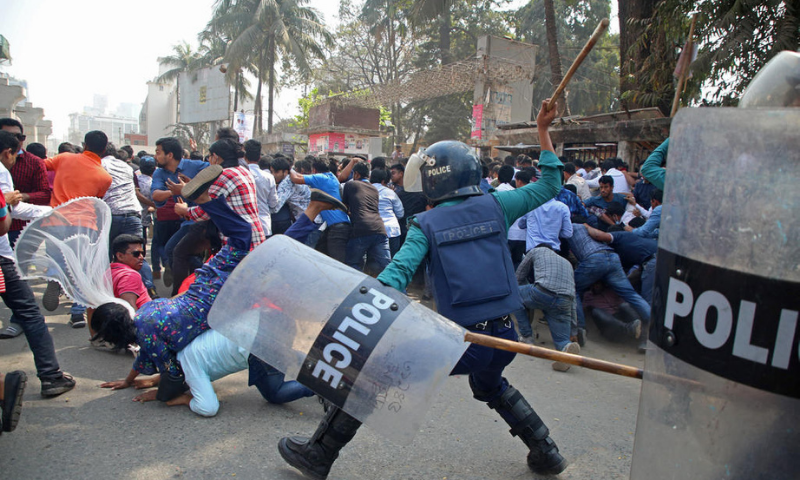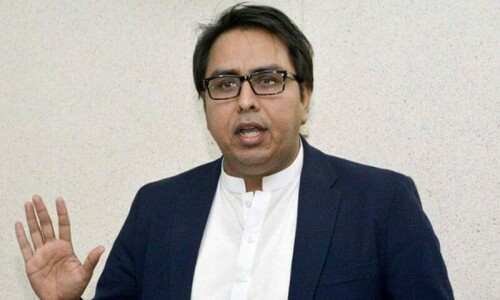DHAKA: At least 10 people were injured on Sunday as Bangladeshi police fired rubber bullets and tear gas during a third day of protests sparked by the death of a prominent writer and government critic in jail.
Mushtaq Ahmed, 53, collapsed in a high-security prison and died late on Thursday, 10 months after being arrested under a “digital security” law that critics say is being used to silence dissent in the country of 168 million people.
Live footage on Sunday from local television station Channel 24 showed a road and footpath in front of the National Press Club — a favourite protest site in Dhaka — turning into a battleground as police beat protesters with batons to disperse them.
Student activists from the main opposition Bangladesh Nationalist Party (BNP) hurled rocks and attacked officers with bamboo and plastic pipes, prompting police to retaliate by “firing rubber bullets and tear gas”, a police official said.
“They did not take any permission (for the protests),” he added, defending the police move to clear the protesters.
A police spokesman said nine BNP activists were arrested, including several outside the city’s main hospital, over charges of “assaulting police”.
“At least eight policemen were injured,” he said.
BNP spokesman Rizvi Ahmed said about 30 party activists, including a senior leader, were injured in the clashes.
He added that more than 500 protesters had gathered at the press club, trying to form a human chain.
He defended the party not having sought permission for the protests at the National Press Club, saying that historically no clearance was needed to hold rallies there.
“As they stood there for a human chain, (police) baton-charged indiscriminately,” he said.
“It is a murder,” he said of Mushtaq Ahmed’s death. “We think the state is involved.”
Calls for action
International and local rights groups have demanded a swift probe into the death of the writer, who was arrested over comments posted on social media criticising the government’s response to coronavirus.
Ambassadors from 13 countries, including the United States, France, Britain, Canada and Germany, expressed “grave concern” over the case.
He had been detained under the Digital Security Act, passed in 2018, which rights groups say has been used to silence critics with hefty fines and lengthy prison sentences.
Ahmed was denied bail at least six times.
Bangladesh Prime Minister Sheikh Hasina on Saturday shrugged off concern over the internet law, Ahmed’s death and criticism of her government’s rights record.
Demonstrators have marched at Dhaka University for several days chanting slogans condemning the government’s treatment of Mushtaq Ahmed as well as other writers, journalists and activists.
At least eight people have been arrested since the protests erupted shortly after midnight following Ahmed’s death on Thursday.
Among them, seven were student activists from two left-wing groups and a labour leader in the southern city of Khulna.
Ruhul Amin, 38, was detained on Friday over charges that he shared Facebook posts by Ahmed and had condemned the writer’s death, his lawyer Kudrat-i-Khuda said.
“He has been charged under the Digital Security Act and remanded into police custody for two days,” he said.
Student activists said they have plans for more protests in the coming days, including a march to the prime minister’s office calling for justice for Mushtaq Ahmed and the repeal of the Digital Security Act.
A court in Dhaka, meanwhile, rejected a police plea to interrogate a cartoonist who was detained 10 months ago along with Ahmed on charges of anti-state activities and spreading rumours.
In a court appearance last week, the cartoonist, Ahmed Kabir Kishore, told his brother that he was tortured in police custody, which seriously injured his left leg and an ear drum.
Published in Dawn, March 1st, 2021
















































